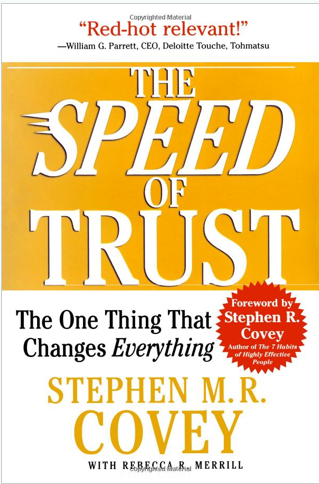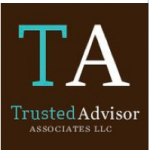 This is a special edition of Books We Trust. Stephen M. R. Covey, Jr. wrote the hugely successful The Speed of Trust: The One Thing that Changes Everything, and I am delighted to interview him in the same week as our own Trusted Advisor Fieldbook hits the street.
This is a special edition of Books We Trust. Stephen M. R. Covey, Jr. wrote the hugely successful The Speed of Trust: The One Thing that Changes Everything, and I am delighted to interview him in the same week as our own Trusted Advisor Fieldbook hits the street.
Some of you may still confuse Stephen M. R. Covey with his famous father, Stephen R. “Seven Habits” Covey. You will no longer confuse them after this interview.
I first reviewed The Speed of Trust nearly four years ago, and the success of the book has since only accelerated. Stephen’s message has been heard globally in all walks of business and society. It is a compelling formulation that has stood the test of time.
Stephen also has a new book coming out in January; we got him to talk about that as well.
Why Trust
Trusted Advisor Associates: Stephen, first of all, thank you for joining us. It’s a privilege to have your voice in this series.
I’m guessing this book did not come to you in a flash of overnight insight. It has all the earmarks of thoughtful development. At the risk of oversimplifying—how did you get interested in trust in the first place?
Stephen Covey: Great to be with you, Charlie. My excitement for trust grew out of a number of simple, yet profound, experiences I had as a practitioner. For example, I’ll never forget an experience several years ago when a company I was in charge of worked with two different suppliers to provide the same product for our business. Both had good people and good reputations.
We started off trusting them both. But while one supplier consistently performed, the other was sporadic. We had to put in place redundant inspection processes for the inconsistent supplier which took extra time and cost more money, causing our product costs to rise. We ultimately decided to drop that supplier and do all our business with the one we trusted.
Soon after, I found myself noticing this same phenomenon everywhere: that the economic implications of trust were as great as, if not greater than, the social implications. I began to see the impact of trust—or the lack thereof—in every area of business and of life. I eventually concluded that trust is the one thing that changes everything, and today I am only more convinced that is true.
TAA: The “speed of trust” is a brilliantly concise statement of an essential aspect of trust. I find that when I quote you, “As trust goes up, speed goes up and cost goes down; as trust goes down, speed goes down and cost goes up,” people’s heads nod vigorously. That is distilled, refined essence of insight—how did you come to that simple, precise formulation?
Stephen: I could see it everywhere I turned. I could see these dividends of trust—speed and cost—everywhere in my business and in client organizations we were working with. And it worked in either direction whether the trust was low or high. Because trust impacts so many things—again I call it “the one thing that changes everything.” The biggest challenge was to keep this insight simple and focused, instead of trying to cover the waterfront.
It seemed to me that in the discussion of trust, what had too often been neglected or at least was unpersuasive, was what I call the “economics of trust”—showing the hard-edged, quantitative, tangible dimensions of trust. I felt that speed and cost was the best way to capture that. Speed was the biggest insight since it is something people immediately resonate with, but cost was equally important since it was the most quantifiable of all the measures.
Rich Details
TAA: The story of Warren Buffett doing a mega-deal with Wal-Mart in a half-day meeting and a handshake was brilliant. How did you come to hear of that?
Stephen: I always study Warren Buffett’s management letters in his annual reports and I know how he operates with enormous trust in his leaders. He shared this experience of his remarkable story of the Wal-Mart/McLane deal in one of his letters [the 2004 Berkshire-Hathaway Annual Report] and I immediately could see that it was a superb illustration of the speed of trust, specifically demonstrating how, as I often say, “nothing is as fast as the speed of trust.”
More recently, I met with Grady Rosier, the CEO of McLane today and also at the time of the deal, and he described to me how this deal could be done so fast, saying, “You also have to understand, it is a core business philosophy at Berkshire-Hathaway, the trust. Warren’s ability to acquire quality companies is built around the trust.”
TAA: In the course of writing the book, was there anything that surprised you, that you wouldn’t have guessed going into the project?
Stephen: I found the deeper and deeper I got into the writing, the more and more persuaded I became that one of the main reasons trust had been so grossly underestimated and neglected was because it is so obvious, so fundamental, so simple that we tend to look right past it. It’s common sense—but unfortunately it’s not common practice.
Trust Movement
TAA: How would you characterize the market’s response to your message of trust? What do you find people most commonly say about it?
Stephen: There’s been an overwhelming response, especially today, because we’re increasingly operating in a low-trust world. And as Buffett says, “Trust is like the air we breathe. When it’s present, nobody notices. When it’s absent, everybody notices.” Today, almost everybody is beginning to notice the loss of trust. So the most common response I get from people is how relevant trust is to what’s going on with them in their world today—with all stakeholders.
TAA: What would you say are the biggest barriers and obstacles to trust in business these days?
Stephen: I think the biggest barrier is what I call counterfeit behavior. Counterfeit behavior is like counterfeit money—it looks like the real thing, but upon closer inspection, you realize it’s not. Examples of counterfeit behavior include “spinning” instead of talking straight; hidden agendas instead of transparency; overpromising and under-delivering instead of keeping commitments; blaming others instead of practicing personal accountability; “covering up” instead of righting wrongs; and so forth.
The 13 behaviors of high-trust leaders I identify in The Speed of Trust all have opposites and counterfeits. The biggest problem is less about trust’s opposite—it’s obvious to people that won’t work—and more about its counterfeit. The counterfeit appears that it might work and often is culturally acceptable. There are many industries, companies and cultures in which counterfeit behavior is the prevailing norm and practice.
An example of counterfeit behavior being the prevailing norm can be seen in politics today. But as a result of this type of behavior, we don’t trust politicians. A 2011 GfK study of the most trusted professions in 19 countries showed politicians dead last—by a wide margin. Part of it is the nature of the challenges politicians are facing today, but part of it is how counterfeit behavior has too often become the accepted norm.
Global Trust
TAA: I’ve found that trust dynamics are global—but the cultural expressions of those dynamics vary a lot. Do you have any specific observations about similarities or differences across cultures?
Stephen: I agree with your assessment, Charlie. I put it this way: the principles behind trust are universal and timeless but the specific practices can be very cultural. The key is to separate the principle from the practice. Too many confuse the practice with the principle. So, for me, the two key behaviors that help us cross cultures are to listen first and then to demonstrate respect for what we hear. If we do that well, we’ll be in a position to understand how trust plays out in a given culture.
Take the behavior I call “Talk Straight.” The principle behind the behavior is truthfulness—telling the truth. But the particular practices behind the behavior will vary within different cultures. For example, talk straight might be manifested differently in The Netherlands who are renowned straight talkers (the common expression is that “you can’t offend the Dutch!”) than perhaps in many Asian countries where it is typically more subtle, nuanced and balanced (and sometimes achieved through intermediaries).
If we listen first and demonstrate respect for what we see, we usually can come to a better understanding of what trust means in different cultures and situations.
TAA: You’ve contributed, even driven, a global awareness of the role of trust. Do you think it’s a movement that will stick? Are you worried that it may come to be seen as a fad?
Stephen: I’m biased, of course, but I predict it will be a movement that will endure and ultimately transform society. Here’s the paradox: at the same time that we’re seeing a crisis of trust almost everywhere we turn, we’re simultaneously beginning to see a “renaissance of trust” as well—with people, leaders, organizations, and causes that are emerging and rising up to support a better way of leading and living.
For example, consider companies such as SAS Institute, Zappos.com, and Wegmans Food Markets—all of which lead out with trust. And consider leaders such as Indra Nooyi of PepsiCo, with her deliberate focus on “Performance with Purpose.” And consider the best of Sustainability and Corporate Social Responsibility initiatives. Plus, consider causes like Conscious Capitalism and the emergence of Social Businesses.
I don’t think trust will fade away; rather, I believe it will increasingly become part of the fabric of how we lead. In fact, if we’re not creating trust, we’re not leading—we might be managing, we might be administering, but we’re not leading. And leadership is not going away anytime soon.
TAA: What do you say to skeptics who suggest an individual can’t make a difference regarding trust in the business world? Any advice?
Stephen: If you think the problem is “out there,” that very thinking is the problem. We’ve got to take ownership for this. The ripple effect metaphor is very real as it relates to trust. Trust is an inside-out process. That doesn’t mean we don’t need leaders at the top starting with trust, because we do. It simply means that we don’t need to wait for the leaders at the top to lead out with trust because each of us can take the first steps—wherever we are.
And if we get results in a way that inspires trust, our influence will expand dramatically and we’ll become the ripple effect ourselves for our team. Or our team will for the organization. Or our business will for the industry. Or our industry will for society. And so forth.
Looking Forward
TAA: You have a new book coming out in January. What can you tell us about it―we’re eager to know!
Stephen: The book is called Smart Trust. In a nutshell, it’s about how to trust in a low-trust world. It takes the two extremes—blind trust based on gullibility where people end up getting burned at one extreme, versus distrust based on suspicion where people don’t even see the possibilities at the other extreme. It presents Smart Trust as a third alternative, a practical way of operating with high trust in a low-trust world, of navigating risk while maximizing possibilities.
The book also focuses on how trust not only impacts prosperity but also how it changes energy and joy—hence the subtitle of the book, Creating Prosperity, Energy, and Joy in a Low-Trust World.
TAA: Stephen, thank you so much for taking this time with us. You have done a great service to the cause of trust in business, and it’s a pleasure to be able to help give it the recognition it deserves.
Stephen: Thank you, Charlie. I reciprocate your kind words because I think so highly of you and your tremendous contributions to this field. It’s great to be co-catalysts together in helping to bring about a renaissance of trust!

 This is a special edition of
This is a special edition of  Join us at one or more upcoming Trusted Advisor Associates events. This Fall, we’ll be hosting and participating in events in Baltimore, MD; Minneapolis, MN; and through globally accessed webinars.
Join us at one or more upcoming Trusted Advisor Associates events. This Fall, we’ll be hosting and participating in events in Baltimore, MD; Minneapolis, MN; and through globally accessed webinars. Wed. Oct 12th Copenhagen, Denmark Charlie Green
Wed. Oct 12th Copenhagen, Denmark Charlie Green The next
The next We’ve gone and done it.
We’ve gone and done it. In honor of the US Labor Day holiday, we are not posting content today.
In honor of the US Labor Day holiday, we are not posting content today.